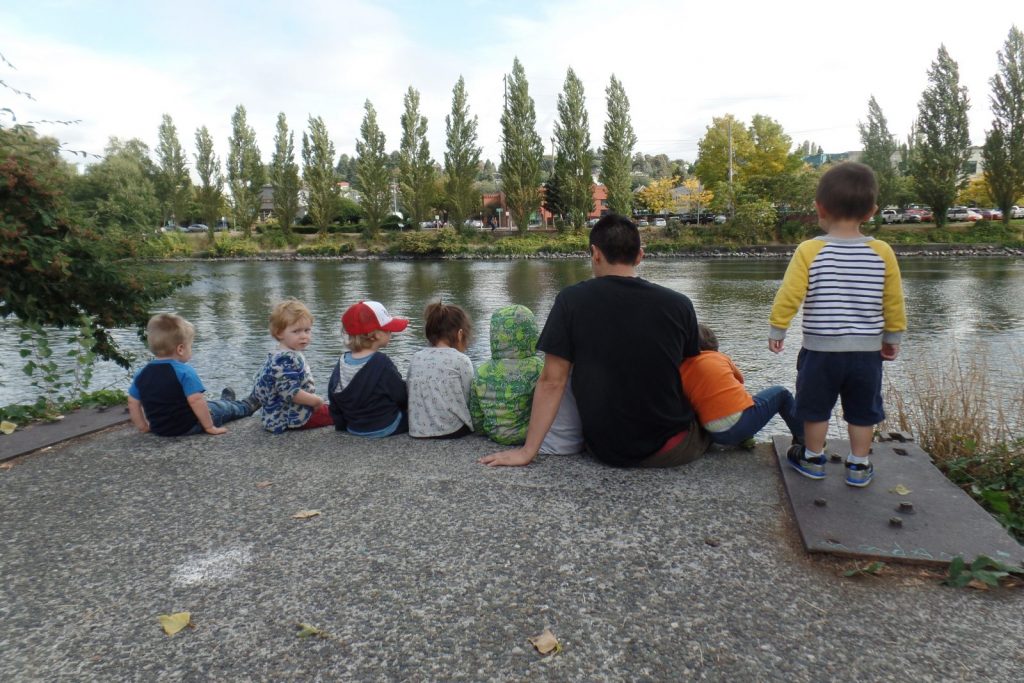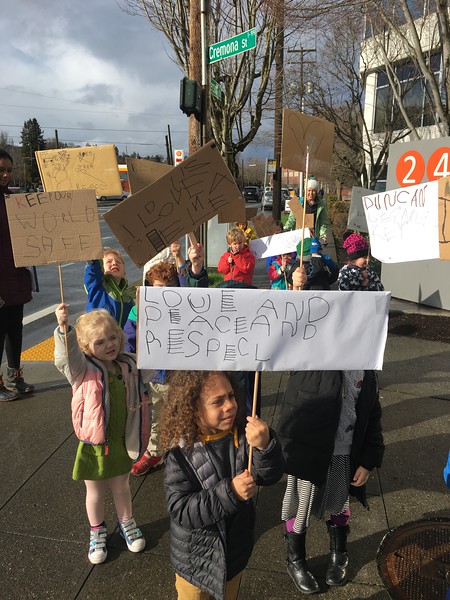
Risk-taking and Social Activism (Part 1)
This is a two-part series about fostering social activism in young children.
In Part 1, Hilltop educator Lauren Mayo (she/her) shares some of her own experiences learning about injustice and activism as a young child. She challenges readers to reflect on the ways that they are taking risks with their own children – at home or in classroom settings – in order to teach them the truth about inequity and justice in our society, and help them move into action.
In Part 2, Hilltop educator Becky Krueger (she/her) will share some examples of what this kind of risk-taking can look like in a preschool classroom setting.
When my friend asked me if we should go to the first of the recent protests in Seattle, against police brutality, there was no question: my answer was yes.
What gave my friend and I no pause about attending a protest was our activist parents: mothers who marched for women’s rights and fathers who fought for the environment. I personally remember going to the World Trade Organization (WTO) protests here in Seattle: I was 7 years old at the time, my sister was 4; my fondest memory was helping to paint cardboard turtle cut-outs that people wore at the protests.
No one would compare the contentious WTO protests to the calm, unified feeling of the Women’s March in Seattle 18 years later. My parents had to do a some amount of risk-assessment before deciding to take us back then, as kids. Although I was too young to remember those conversations, I’d like to think they came to the same conclusion that I hope readers of this blog come to as well: when standing up for someone’s rights, if you do not feel like you are taking a little bit of a risk, then you aren’t doing enough.
Let’s apply this idea to our nation right now, and what is happening today. Across the country, millions of people are protesting police brutality, injustice and systematic racism, prompted by the murders of George Floyd, Ahmaud Arbery, Breonna Taylor, and countless others. When I say “risk,” I am putting that idea in the context of Black and Brown lived experiences. I am talking about the “a BIPOC (Brown, Indigenous People of Color) person can often not even walk into a 7-11 to get a soda without fearing for their life” kind of risk.
 I’m sure at this point you might be feeling a little uncomfortable…and that’s the point. As a white person myself, and for other white people who are reading this, know that these conversations are supposed to make us uncomfortable, you are doing a lot of unlearning as part of this process. We have to lean into the discomfort in order to have important conversations. So please, keep reading.
I’m sure at this point you might be feeling a little uncomfortable…and that’s the point. As a white person myself, and for other white people who are reading this, know that these conversations are supposed to make us uncomfortable, you are doing a lot of unlearning as part of this process. We have to lean into the discomfort in order to have important conversations. So please, keep reading.
I believe that risk can look different for everyone. The goal is to get yourself to a place of feeling like you have taken a risk, and you feel even a little uncomfortable. Once you’re uncomfortable, you can continue building on that. For me, this looks like going to marches, having hard conversations with family members, having hard conversations with strangers on social media, even writing this article. So I invite you to reflect on what will this look like for you: what actionable things can you do right now that also push you to take risks and feel uncomfortable?
I think that for a lot of white parents and educators, the idea of talking with their kids about race falls into the “uncomfortable” or “risk-taking” category. Many BIPOC parents share that they talk to their children about race starting from a very young age. It is a conversation families of color have out of necessity, to help ensure the safety and well-being of their family. It is critically important for white parents to step up and engage in similar uncomfortable conversations with their white children. I believe that many white parents are currently taking steps that create great opportunities to start these conversations, as well as model what it’s like to be an activist, advocate and ally. This requires you to do more than just post a black square or reshape something on social media, modeling anti-racism means doing more than performative or optical ally-ship. If you have children at home, consider some of the opportunities below for sparking conversations. If you teach in a classroom, consider sharing these ideas with families at your school, or adapting them for your classroom.
If you are donating supplies like gloves and masks to help protestors, that can be a good road to start conversations about what a protest is, and why people want to march. If you are making donations to the NAACP, Food Banks, the ACLU, etc., sit down and do it with your child, model for them what it is like to make a donation and how and why you choose a particular organization. Start a conversation about the ACLU helping people fight injustice…children will understand this as working against “unfairness.” You can explain that, right now, they are helping people with Black and Brown skin fight unfairness because for many years their lives have been unfair. And when they ask why this is so, be honest (and if you don’t know the answers, it’s your responsibility to educate yourself).
Have you been making an effort to support BIPOC businesses? Getting takeout from BIPOC restaurants? Love it! Have you been telling your kids why? If not, then make plans to do it this weekend. Point out to your child that you are ordering from a specific restaurant for a specific reason. This is an opportunity to start a conversation about why you want to support a specific community. For example, you can address the economic unfairness faced by that community, by explaining that people who have white skin have had more opportunity to have a successful businesses and earn more money. Take a stand by letting your children know that you as a family want to help Black and Brown families have just as much success.

Lauren (she/her) is an educator with 3-to-5 year olds at Hilltop Children’s Center where she has worked since 2017.
Hilltop Educator Institute collaborates regularly with change agents across North America, Europe and New Zealand to provide professional development opportunities in Greater Seattle through evening, half-day and full day workshops known as the Educator Discussion Series (EDS). Hilltop Educator Institute provides resources and support to educators, programs leaders, children’s advocates, and the community at large, in order to widen access and opportunity for all children. To study at Hilltop for a day, register for upcoming workshops, or learn more about our services, email Mike at institute@hilltopcc.org or visit us at www.hilltopcc.com/institute.